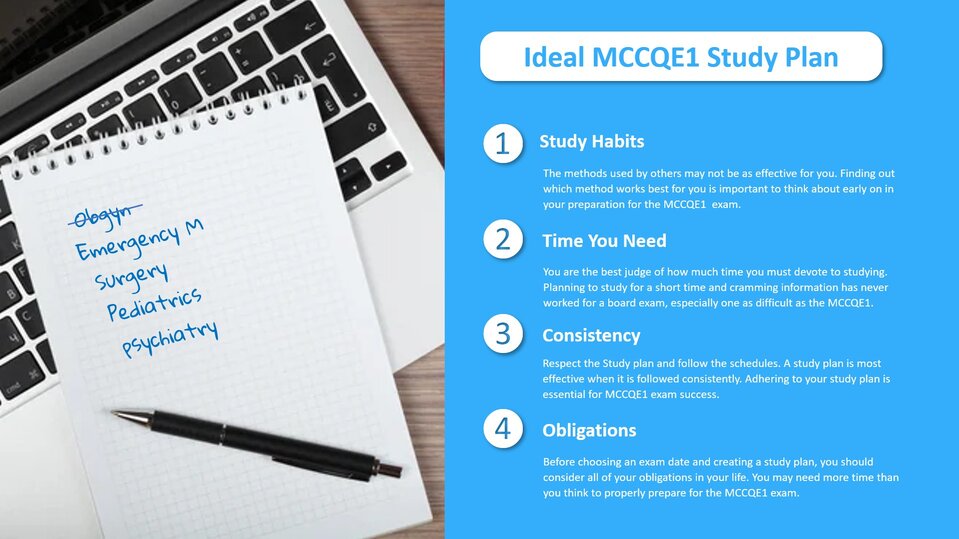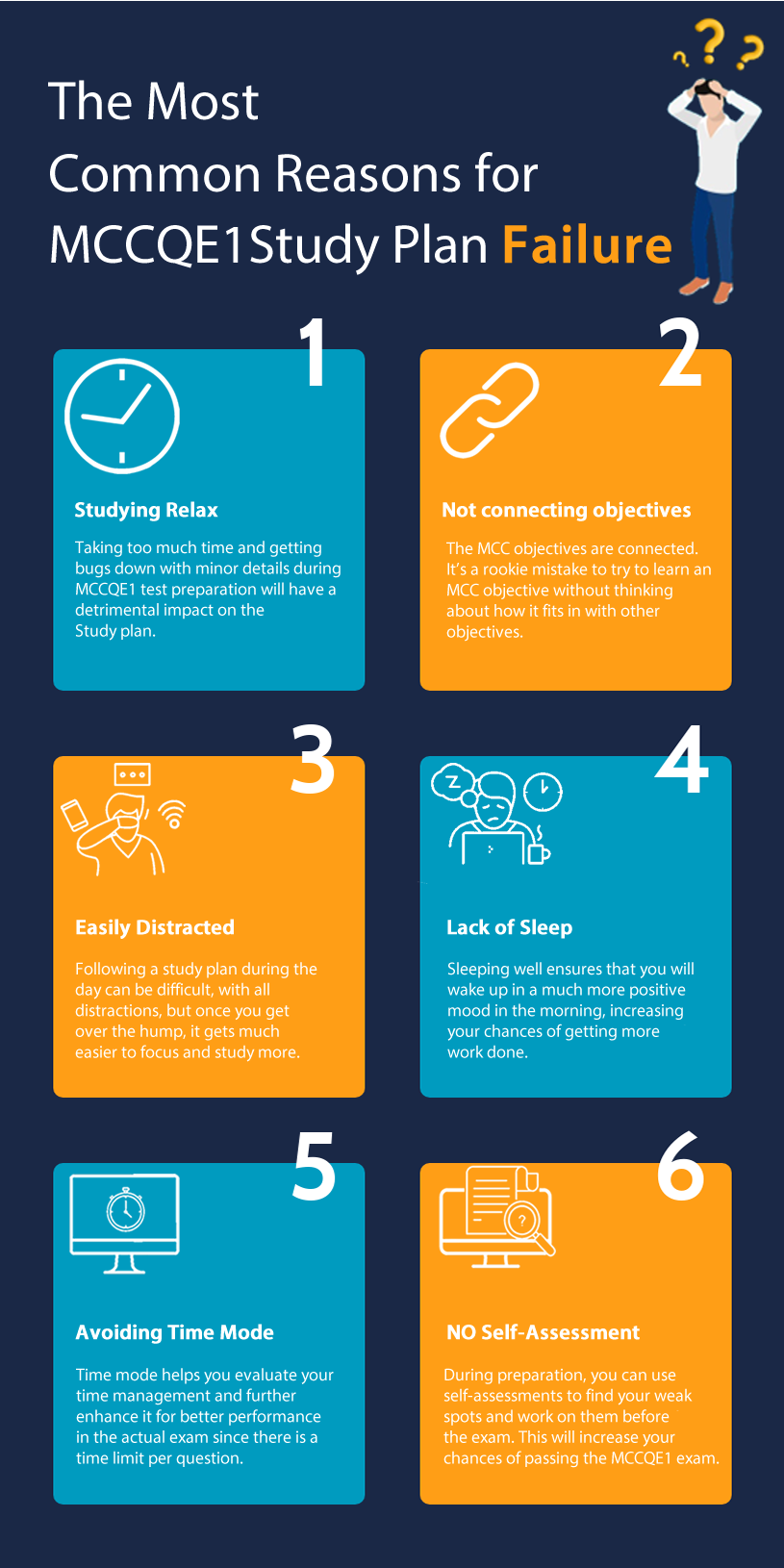How to Create a Study Plan for the MCCQE1 Exam

Canadian board exam, the Medical Council of Canada Qualifying Examination (MCCQE) Part I, is a high-stakes standardized exam testing clinical knowledge, use of diagnostic tools, and treatment decisions. The MCCQE1 exam evaluates your understanding of common illnesses as anticipated by a qualified Canadian physician. In order to successfully pass the MCCQE1, you must commit yourself to acquiring a thorough and comprehensive understanding of the Medical Council of Canada (MCC) objectives, which are organized under the Canadian Medical Education Directions for Specialists (CanMEDS) roles. Luckily, Ace Qbank for the MCCQE Part I has tackled and covered the MCC objectives.
Let me, guest! The MCCQE Part 1 exam is approaching, and you’re wondering how to prepare. Allow us to assist you. We designed an ideal study plan to help you prepare, study, and score the highest possible on the MCCQE1 exam after collecting extensive customer feedback, hearing their success stories, and reviewing the study plans that led them to success.
Studying for the MCCQE1 exam can be stressful, but if you start early and stick to a study plan, you’ll be able to identify your weakest areas and prepare better for the exam. This blog will share tips on creating the most successful study plan and exploring the primary causes of study plan failure so that you can prevent them.
What Is The MCCQE1 Study Plan?
The MCCQE1 study plan is a well-organized plan that outlines study periods for learning the MCC objectives and effectively preparing for the MCCQE1 exam. You must set aside committed time each week for studying, just as an employee must set aside dedicated time each week for regular work. The only difference is that you must have self-discipline and drive to finish your studies without the continual reminders of your manager.
What Is The Ideal MCCQE1 Study Plan?
You may ask yourself, what does the perfect MCCQE1 study plan look like? The ideal MCCQE1 plan is the one that is designed based on your schedule and in accordance with your other commitment.
An effective study plan is one that you can commit to, and you can realistically accept the various demands of your time. You will have more success with your study plan for the exam if you take into account your personal needs and preferences. For example, if you find that the weekends are your least productive days, then it would be ideal not to schedule the majority of your studying for those days.
The recommendation for the MCCQE1 study plan is six months before the exam date. You should make a plan that starts at least six months before your exam date and, with dedicated study time set up each week, gradually increase the amount of time in the two months leading up to the exam.
It is highly recommended to design a study plan that allows you to devote 20–25 hours every week for six months. Practice questions in both study modes, time and tutor mode, to identify your weak points. Work through the individual topics of difficulty to master them, then use the MCCQE1 self-assessment to re-evaluate your overall understanding. The best part is that Ace Qbank is designed specifically for this purpose.
Why Is A Study Plan Essential For The MCCQE1 exam?
The MCCQE1 exam’s reputation for being challenging and the vast quantity of content you must cover for the exam produces an approach-avoidance conflict situation. This is a situation in which you would want to pass the MCCQE 1 exam with a good score and move on to the residency program. The amount of content you must cover and the skills you need to hone for the exam, on the other hand, cause stress and hinder you from approaching the exam.
The study plan for the MCCQE Part I will eliminate this approach-avoidance situation by creating an organized path for you to achieve your goal – to match to dream residency program. The study plan does this by establishing priorities that divide the whole preparation process into tiny manageable tasks that facilitate studying and make preparation for the exam less intimidating.
Instead of tackling the MCC objectives as a whole, you will divide them into little tasks and handle them on a regular basis based on your schedule and the priority of the objectives. This will take the stress out of the preparation process and allow you to gradually work your way up to your ultimate goal. That is why creating a study plan for the MCCQE1 exam is critical.
6 tips for creating an effective study plan for the MCCQE1
1. Create a Balanced study plan for MCCQE1
When it comes to studying for exams, there is no one-size-fits-all approach. However, you can follow some general principles to create a balanced study plan to cover all the MCC objectives.
When are you going to take the MCCQE1 exam? If you have six months to prepare, you can afford to take a more relaxed approach and focus on understanding the material. If you only have a few months, you’ll need to focus on key concepts and essential MCC objectives.
Needless to say, the best option is to develop a balanced study plan that addresses both vital and relevant MCC objectives. However, in the duration of preparation for the board exam, more focus should be placed on essential objectives in order to enhance the chances of passing the exam.
The MCC objectives serve as the foundation for the MCCQE Part I questions; comprehensive coverage of all MCC objectives, without a doubt, leads to success.
2. Adjust Your MCCQE1 style plan
It’s important to be flexible when it comes to studying for exams, find a balance between study, work and rest, and make sure that you are taking care of your mental and physical health. If you find that you are struggling to keep up with your studies, it may be necessary to adjust your study plan.
You need to allocate time for other activities; if you schedule several long days in a row of studying, you will get discouraged and be tempted to give up. It’s recommended that you schedule time for nonacademic activities, such as exercise, household chores, and socializing with other friends.
There are a number of ways you can do this. You may need to wake early in the morning to study (better time management), you may need to find a more efficient way to study (active studying), or you may also need to take a break from your studies every now and then to rest and recharge.
Your study plan is all about helping you be more efficient and productive; if you find that it’s not working, don’t get discouraged. It’s ok to make changes and adjustments as you figure out what works best for you.
3. Reinforcing Your Weakness Before The MCCQE1 exam
It’s easy to slip into the trap of just doing questions or start practicing on disciplines that you are comfortable with, believing that you will ultimately become great at all disciplines eventually through preparation. However, this is not the case because it is easy to get comfortable and stop challenging yourself to study more and cover more objectives when you feel comfortable.
On the other hand, when you’re not as strong in an area, you have to work harder and push yourself more to improve; understanding new objectives needs practice and takes time. Now, if someone spends more time with familiar or less important objectives, there will not be enough time to properly cover the essential objective for the MVCCQE1 exam.
One of the ways to get around that is to force yourself to study material with which you are unfamiliar, as well as to focus on your weaknesses and develop them into strengths. It may need more effort in the short term, but it will pay off in the long run as you accelerate through familiar objectives and cover them in no time.
4. Use Active Study Strategies
The most common strategy to prepare for medical board examinations is to use a decent review book in conjunction with an excellent online question bank.
Doing questions is an active learning strategy, whereas reading books is a passive learning method. Multiple choice questions from the question bank help you assess your knowledge, whereas reading a book improves your grasp of medical concepts. By putting these together, you can cover all of the MCC objectives, learn everything you need to know for the exam and boost your performance.
The good news is that Ace Qbank is designed based on the MCC objective to facilitate preparation for the exam. In addition, the Question bank features a function that allows you to make a question block out of incorrectly answered questions. To help you not only repeat but also evaluate the recall of the learned content.
Toronto Note is the only book that matches well with Ace Qbank and annually updates the content. It’s highly recommended you get it; the book is available on Amazon.ca and at the University of Toronto. It’s the best investment for your MCCQE Part I preparation.
This method of studying is often used because it is considered to be the most effective way to learn and remember the material. When it comes to the boards, you cannot just read the material once and expect to remember everything. You need to read it more than once and keep reminding yourself of the most important information to really learn it.
5. Prioritize the objectives during the MCCQE1 preparation
Every doctor has to be familiar with essential objectives; if you don’t, you shouldn’t even bother taking the exam. For instance, all doctors need to be familiar with medical emergencies and how to manage them properly.
Every discipline has its own essential objectives; covering them is always the priority. The Ace Qbank is designed based on the MCC objectives and covers all essential objectives with detailed explanations supported by flowcharts, summary tables, and colourful illustrations to enhance recall of key concepts.
It is human nature to procrastinate and put off learning something new or working on difficult tasks, but doing so may leave you unprepared. When starting something new, it’s best to start with the most important objectives and then move on to the rest of the related objectives.
6. Consistency is the key to success in the MCCQE1
You must understand that mastering the content will take some time, maybe more than you planned. Therefore, a study plan should be realistic; a plan that you cannot keep up with or is hard to be consistent with is useless. Before you sign up for your exam, do your best to spread out your study hours over a longer period of time. This will help you avoid burnout and allow you to study effectively, as well as more review of the key concepts that lead to a better chance of passing the MCCQE1 exam.
Respect your schedule – A study plan works best when it is followed continuously. Make a study schedule that you can adhere to. One of the main reasons people fail the MCCQE1 exam is that they do not follow their study plan. Remember that sticking to your plan is the key to success in the MCCQE1 exam.
Mistakes That Can Lead to MCCQE1 Study Plan Failure:
1. Being Slow And Taking Your Time
Taking too much time and getting bugs down with minor details during MCCQE1 test preparation will have a detrimental impact on the Study plan, regardless of how well it is put together.
Assuming that learning is a fast process, it would be beneficial to use your limited time to prepare for the MCCQE1 exam by learning new things and revising them more frequently so that you know them by heart. This way, you can dedicate more time to better understand the concepts and hone your test-taking skills since you have already taken care of the difficult part of preparation.
2. Not Connecting MCC Objectives
The MCC objectives are connected. Less seasoned candidates try to learn an MCC objective independent of its relationships with interrelated objectives. This rookie mistake makes reviewing material much more difficult and time-consuming to the point that one would rather study than review material.
Revising learnt medical concepts allows you to identify the links between objectives. Connecting the objective makes revision faster every time, improves key concept retention, and minimizes exam anxiety by reducing the knowledge you need.
This will eliminate the need to cram sessions close to the exam date.
3. Easily Distracted During The Day
Do you think you don’t have enough time in the day to study? Most people feel this way and continuously lament the lack of time during preparation for the board exam. However, it is unhealthy if you do not have time to do simple chores such as cooking or completing your daily to-do list.
One way to stay ahead and on track is by starting the day early. Waking up early morning gives you an advantage in the modern world we live in and help you accomplish everything you want to do.
The other thing that helps you accomplish more is the prioritization problem; it ensures that you make the most efficient use of your time. Everyone has a problem in his or her life. Therefore, it is best to determine what is essential to you by considering your study plan and the activities you wish to undertake.
Do not begin with any work until you have questioned yourself, “Do I need to do this now?” Don’t do anything if you don’t have to right now. Priority chores should be completed first, and then go on to the others.
Finally, try to stay focused during the day. Being easily distracted and sidetracked by the cacophony of voices, text messages, e-mails, and social media notifications will make you less productive.
Following a study plan during the day can be difficult, but once you get over the hump, it gets much easier, and you will study more during the day.
4. Not Getting Enough Sleep
A straightforward yet brilliant way to enhance your time management during the day is to get a good night’s sleep. On average, people who sleep for seven to eight hours per night are more productive, happier, and produce higher-quality work than those who receive less than seven hours.
Sleeping well also guarantees that you will wake up in a much more positive mood in the morning, making it more likely that you will get more work done.
I know you’re aware of this, and I also understand how challenging it is to get a proper night’s sleep during preparation for the MCCQE1 exam. But irregular sleep can significantly impact your productivity during the day and memory creation, leading to constantly adjusting the study plan and anxiety.
Read more on sleep during the MCCQE1, memory creation and retention enhancement.
5. Not Using The Time Mode Of The Ace Qbank
The MCCQE Part I is more than simply a qualification exam to assess the medical knowledge, skills, and ability to apply that information; it also evaluates your test-taking skills. Time management is one of the most important test-taking skills that contribute significantly to exam success.
Ace Qbank offers two study modes: tutor and time mode. Time mode helps you evaluate your time management and further enhance it for better performance in the actual exam since there is a time limit per question. Using tutor mode exclusively will put you at a disadvantage, so make sure that you spend equal time in both study modes.
6. No Self-Assessment Before The MCCQE1 Exam
One of the worst things you can do to prepare for the board exam is to study without testing yourself first. The MCCQE1 self-assessment is a great way to see how prepared you are before taking the actual exam.
You can use self-assessments to identify areas of weakness during preparation and improve these areas before the exam, which increases the chance of passing the MCCQE1 exam.
Fortunately, Ace Qbank has taught this and provides self-assessments for the MCCQE part I, which are simulations of the actual board exam’s timed environment.
Read more on the MCCQE1 self-assessment.
There you have it — HOW TO CREATE STUDY PLAN— 6 Tips and 6 Mistakes to avoid to help you create an effective study plan to build confidence, maximize your study time, and pass the exam!
Need Help with Preparation for The MCCQE1 Exam
Proper preparation is essential for success on the MCCQE1 exam, and you should make every effort to earn the maximum possible score on the MCCQE1 exam. If you’re having trouble keeping to your study plan or if certain objectives are challenging for you, get the help you need to pass the MCCQE1 exam on the first attempt.
Ace Qbank has your back with over 2400+ high-yield questions, many Clinical Decision-Making (CDM) cases, and several self-assessments available to challenge and push you to your limit.
To prepare for the MCCQE1 exam, we developed the Ace Qbank based on the Medical Council of Canada (MCC) objectives. Our team reviews the question bank regularly based on current guidelines and recommendations, and we implement any changes we make as soon as possible to enhance your learning experience. Our objective is to keep the information up to date and in compliance with medical standards of care to avoid surprises during the test. At Ace Qbank, we’ve got you covered.
We invite you to sign up for the Ace Qbank demo today and see the difference our elite question bank makes!





